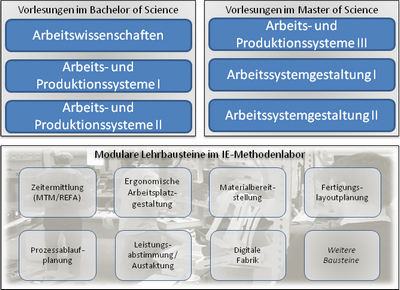Hands on IE!
Development of Modular Teaching Modules for Demand-Oriented and Application-Oriented Learning in the Training of Industrial Engineers

Problem
In manufacturing companies, the tasks of an industrial engineer represent an important cross-sectional or interface function. Industrial engineers are the link between technical and economic management and ensure the operative implementation of strategic goals and planning specifications.
The classic teaching concept of university teaching, i.e. the frontal imparting of knowledge in lectures, is only partially suitable for the training of industrial engineers. The reason for this is the only limited interactivity possible and the lack of independent development of solutions in a practical environment, which is necessary for acquiring methodological competence.
Objective
The academic IE education at the Chair of Work and Production Systems pursues the goal of teaching students the theoretical basics of work system design and to deepen these in an industry-related context in an application-oriented manner. Thus, in the courses of the chair, the prospective engineers of the study programmes mechanical engineering, industrial engineering and logistics acquire the necessary methodological competence in industrial engineering, building on the classical engineering subjects, which enables them to design work systems from a socio-technical point of view and to develop or optimise holistic production systems.
Procedure
At the Chair of Work and Production Systems, the training of industrial engineers is divided into two sub-areas.
- The basis is the teaching of theoretical content through a step-by-step concept of lectures that build on each other.
- In addition, with the establishment and use of a methods laboratory, the chair has created the basis to support the existing teaching with industry-related application scenarios and to expand it with new content.

The methods laboratory at the Chair of Work and Production Systems at TU Dortmund University is characterised by the provision of modular workstations and the associated equipment. In this industry-oriented learning environment, the theoretical teaching content from workplace design is currently applied under professional guidance within the framework of a one-day practical laboratory.
For the further development of the methods laboratory, a modular teaching concept is therefore to be developed based on the foundations already created, which builds on thematic modules to deepen the teaching content taught in the lectures in a demand-oriented manner.
- In a first step, an overall concept of the teaching content will be developed on the basis of existing lecture series and current research results. Based on this overall concept, individual focal points are derived in order to define teaching modules.
- Based on this, these modules will be developed in a second work package.
The evaluation of each module is then carried out within a test phase, in which knowledge transfer and procedures are reflected upon together with the students.
Based on the findings of the pilot phase, the modules will be further developed and integrated into the existing teaching. The aim is to make the connection between theoretical knowledge transfer and application in the methods laboratory a fixed component of the training of industrial engineers at the TU Dortmund.
Research- and Development Partner
Mercador Foundation
Volkswagen Foundation
Bologna Future of Teaching


![[Translate to English:] [Translate to English:]](/storages/zentraler_bilderpool/_processed_/2/6/csm_Altes_Maschinenbau-Gebaeude_3a1a87015a.jpg)